Peer Mentor Croydon
Act as a peer mentor for our people making use of our housing services in Croydon
ROLE PROFILE
Role Title: Peer Mentor
Location: Croydon
About Thames Reach
Thames Reach is a charity based in London, specialising in helping people with complex and multiple needs, including those associated with poor mental health and substance misuse. We manage a range of services, including street outreach, frontline hostels, day services, specialist supported housing and employment and skills schemes. Last year we helped more than 10,000 people.
Purpose of the role
Croydon Housing First helps people with a history of sleeping rough to settle into their own accommodation, offering immediate, specialist support to make sure people don’t return to the streets, and instead move effectively towards recovery and independent living.
The project provides 20 people with their own flat, all supported by a Thames Reach key worker who helps the tenant to access the right services to meet their needs, be it related to health, skills, benefits or employment.
Thames Reach staff also help tenants to source furniture, organise bills, and create a home environment in which they feel secure and comfortable.
What you will be doing
In this role, you will be supporting us with the following tasks:
- To provide information, support and encouragement to a mentee, leading and guiding by example in a one-to-one or group environment
- Adopt a person-centered holistic approach to enable your mentee to express their needs and aspirations and support them formulate a suitable action plan to enable them to achieve those
- Develop and maintain an up to date knowledge of local services to enable you to advise and signpost mentees
- Assist the mentee in their educational and employment aspirations and acquiring new skills
- Update mentee records including new action agreed and achievements
- Provide some feedback on your observations on progresses made (provide affirmation) and areas they may need to develop further to their achieve goals.
- Review and celebrate all achievements throughout relationship
When would you be needed and where would you be based
We expect volunteers to commit for at least six months with the requirement of 1-2 days a week. Once we have received your application, we will meet with you informally and give you more information on the location and time you will need to commit to the role.
What you can gain from this volunteering role
- Be able to use your skills, knowledge, and life experience to benefit others
- Experience, training, and skills that you can highlight on your CV and in job interviews
- Professional references after 3 months volunteering
- Mentoring and support from our Employment and Skills team
- Better physical and mental health – studies show that volunteers live longer and experience lower levels of stress and depression.
Training and support offered
- A role specific induction so that you understand the role well
- Regular support and supervision from the team to discuss how your volunteering is going and what other opportunities and training may be available to you
- Online or face-to-face instructor led training and e-learning modules to prepare you for your voluntary role
- Access to a range of additional e-learning courses as well as local opportunities for your personal and professional development
- Support from staff and peer support from fellow volunteers
- Reimbursement of out-of-pocket expenses.
What we are looking for
- Good interpersonal skills, enthusiasm, and motivation
- Ability to listen and be empathetic to build rapport with clients
- Good verbal and written communication skills
- Willingness to learn and develop within the role
- Motivation to support disadvantaged and vulnerable people
- The physical ability to work on the streets (there can be a lot of walking involved)
- Awareness and understanding of the need for professional boundaries and confidentiality
- To have the ability to follow Health and Safety regulations, Equal Opportunities and Diversity policy.
- We specifically need people with lived experience of homelessness.
Minimum age: 18
Safer recruitment
Thames Reach undertakes a systematic approach and utmost care at every step of the process of volunteer recruitment, selection, and retention to ensure that those recruited are suitable and appropriate. We take measures to make volunteering at Thames Reach a positive and safe experience.
Are references required: Yes. We will ask for two references, this can be former employers or people that know you well (other than relatives).
Is there criminal record check required: Yes
How can I apply? Complete our online application form or contact us at volunteer@thamesreach.org.uk.




